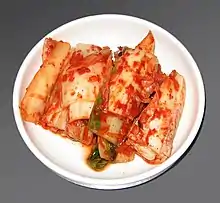김치
Korean

김치 (gimchi)
Etymology
From the hypercorrection in northern dialect to avoid the palatalization against the southern dialect form 짐치 (jimchi), from the pre-modern term 팀ᄎᆡ (thimchoy) → 침채 (沈菜, chimchae, “soaked vegetables”) (via Middle Korean 딤ᄎᆡ (timchoy), first attested in the Hunmong jahoe (訓蒙字會 / 훈몽자회), 1527).
This word appeared in until 15th century and replaced an older term 디히 (tihi) (whence 지 (ji), now only used in the compound words and dialects) , probably because of the disappearance of medial /h/ to shorten of the word length to be hard to exist as single word.
Pronunciation
- IPA(key)[kimt͡ɕʰi]
- Phonetic Hangul[김치]
|
References
- Rei Fukui (2017-03-28) 小倉進平『朝鮮語方言の研究』所載資料による言語地図とその解釈―第1集, 東京大学人文社会系研究科 韓国朝鮮文化研究室, page 57-60
This article is issued from Wiktionary. The text is licensed under Creative Commons - Attribution - Sharealike. Additional terms may apply for the media files.